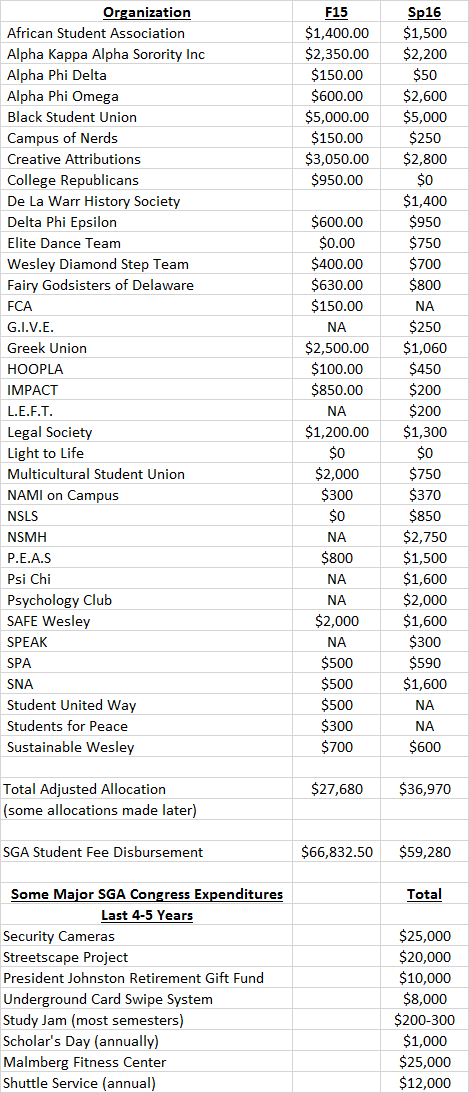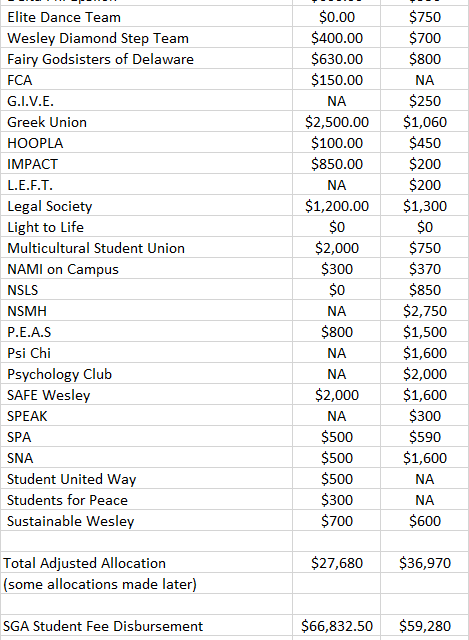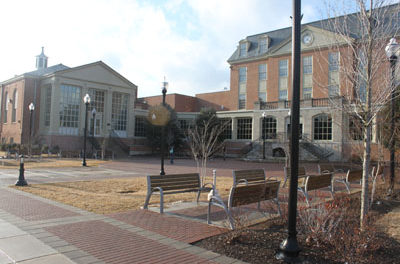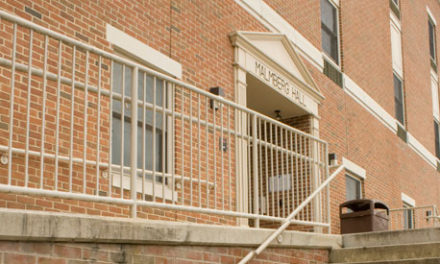By Jacob Bradner, Kristen Griffith and Kevin Johnson, The Whetstone
Creative Attributions President Rachael Daniels believes the Student Government Association distributed money poorly this year.
“When budgets were first distributed, we initially received less than half of our budget from last year,†she said. Her organization puts on the annual fashion show.
Daniels said she was able to convince SGA treasurer Kylie Liberty that Creative Attributions needed more money.
Creative Attributions received $3,050 during the fall, but only $2,800 for the spring.
“Unfortunately, the amount was still much less than last year’s budget,†she said.
Daniels’ organization is only one of many that ask SGA for money to continue to hold events. Sometimes the organizations get exactly what they ask for; sometimes they don’t.
But SGA would not release the budget until after several requests were made to Liberty, SGA President Savannah Durham and SGA Adviser Dr. Cynthia Newton.
The organization allocations, from this semester and last semester, were sent March 23 in an email to all students.
SGA President Savannah Durham said organizations usually get the money they ask for.
“As long as the justification or amount is not unreasonable,†she said. “If for some reason they are not initially allocated enough money, there is always opportunities to ask for more.â€
She said she can’t remember a time, since the three years she’s been on the Board, that a money allocation was rejected.
Dr. Tony Armstrong, professor of political science, said the budget should always be available for everyone to see.
“It’s a fundamental democratic principle that allocation should be open to the public,†he said. “It would be not be (the adviser’s) to share; it would be student government’s to share. Dr. Newton is the adviser to student government, not the boss.â€
Armstrong also detailed the process involved in asking for money.
“You’re supposed to put in a budget in the spring for fall,†he said. “But the way [SGA] been doing it is they’re just going to give everyone minimal budgets. They have been doing that in the fall, I guess, to have something to work with. Before that, they didn’t give everyone budgets until later in the semester. They gave everyone $500-$600 as a starter, and then you’re supposed to put in budget request in the spring.â€
Liberty said it takes hours for the budget committee to decide on allocations. Before allocating the money, they consider the events organizations put on, their spending and their current balance.
“If organizations do not feel they have been allocated enough money to fund their events, they can put in a request for additional funding,†Liberty said. “This has been stated at several Congress Meetings.â€
Some organizations are happy with their allotment, including the Black Student Union (BSU) and AKA (Alpha Kappa Alpha).
BSU received the most money out all the campus organizations – $5,000 for both semesters, or $10,000 for the year, about 8 percent of the total ($126,112.50) SGA distributed to all organizations.
Campus organizations are funded through SGA based on active involvement, Newton said. This money comes directly from student fees.
Every Wesley student pays $47.50 as part of their student fees to go to the SGA. If the college has 1,400 students, that sum would total $66,500 each semester for SGA to distribute. If the money is not spent, it will be “rolled over†into the next semester.
Armstrong said students have the right to know how their money is being allocated.
“They should be able to see what money is being allocated, simply because the SGA is a democratic government elected by students,†he said. “How they handle the money is supposed to be something that’s transparent in a democracy. The U.S. government has to be open about its budget, it’s an open record.â€
Evan Le’Mon, president of BSU, believes this entitles the students to know what is in the budgets of student organizations.
“The money student organizations are using is coming from our pockets, so we should know where our money is going, how it’s being used, and how it is budgeted,†he said.
Daniels believes it’s not a good idea for students to view the budgets.
“I do not feel as though each campus organizations should have the access of knowing what’s in other budgets because it would cause a lot of controversy,†she said
Bianca Velasquez, president of AKA, has similar thoughts.
“I think if everyone was aware you would have orgs questioning why this org received a large amount,†she said. “Especially if there’s an org sitting on thousands of dollar and doesn’t host many events on campus.â€
AKA received $2,350 in the fall and $2,200 in the spring.
SGA doesn’t want to over-fund organizations that aren’t traditionally active, Newton said. If an organization is only active for one out of two semesters, then the next year they will receive less money.
“Sometimes organizations will ask for outrageous amounts of money for no good reason,†she said. “For example, if an organization asks for $5,000, after looking at activities and other factors, we will give them like $3,000â€
Newton said money was allocated based on activity of student organizations.
“The more active you are, generally, the more you are going to need,†she said. “There are organizations that have thousands of dollars in their accounts and don’t do anything with it. It just rolls over semester to semester.â€

SGA Budget





